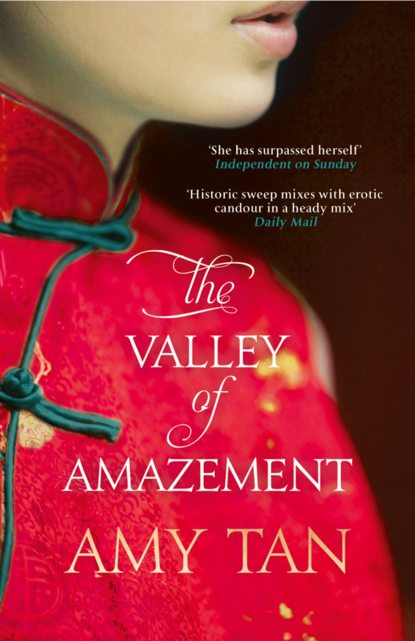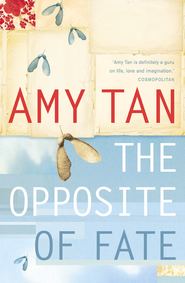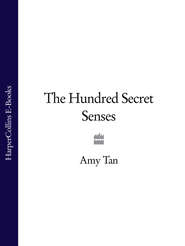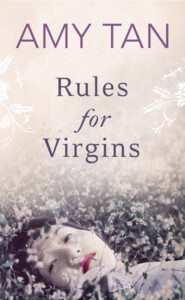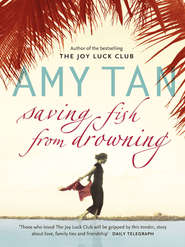По всем вопросам обращайтесь на: info@litportal.ru
(©) 2003-2024.
✖
The Valley of Amazement
Автор
Год написания книги
2018
Настройки чтения
Размер шрифта
Высота строк
Поля
Little Duck wore such a painful grimace you would have thought he had killed his mother. He lifted the lid from the well and dangled his former glory over it. He was shaking so hard the pigtail wiggled like a live snake. Finally he let go and then immediately looked down the well and watched it drown. For a moment, I thought he would jump into the well after it.
Cracked Egg ran into the courtyard. “What’s going on? What’s happening with the food? Why is the water not boiled? Lulu Mimi needs her tea.”
The men sat there, smoking.
“Eh! When you cut off your queues, did you slice out part of your brains as well? Who do you work for? Where will you go if this house shuts its doors? You’ll be no better off than that beggar by the wall with one leg.” They grumbled and stood up.
What was happening? What would happen next? I walked throughout the house and saw the abandoned kitchen with water sitting cold in vats, the vegetables half chopped, the washing tubs with clothes half in, half out, as if people had fallen forward and drowned.
I found Golden Dove and the Cloud Beauties seated in the common room. Summer Cloud was shedding rivers of tears for the end of the Ching dynasty, as if her own family had died.
“I heard that the laws of the new Republic will soon shut us down,” she said.
“The politicians want to show they have higher morals than the Ching and foreigners.”
“New morality. Pah!” Golden Dove said. “They’re the same ones who visited us and were happy the Westerners let us be.”
“What will we do instead?” Summer Cloud said in a tragic voice. She held up her soft white hands and stared at them sadly. “I’ll have to wash my own clothes, like a common washerwoman.”
“Stop this nonsense,” Golden Dove said. “The Republicans have no control over the International Settlement. The Ching did not, and that won’t change.”
“How do you know?” Summer Cloud shot back. “Were you alive when the Ming dynasty was overturned?”
I heard my mother calling for me. “Violet! Where are you?” She came up to me. “There you are. Come to my office. I want you to stay close to me.”
“Are we in trouble?”
“Not at all. I just don’t want you to go wandering into the streets. There are too many people running around and you could be hurt.” Her office floor was strewn with newspapers.
“Now that the emperor is gone,” I said, “will we suffer? Will our house close down?”
“Come here.” She took me into her arms. “It’s the end of the dynasty. That has little to do with us. But the Chinese are overwrought. They’ll settle down soon.”
By the third day, the streets were passable, and Mother wanted to pay a visit to some of her clients to encourage them to return. Cracked Egg said it was dangerous for a foreign woman to be seen out of doors. Drunken patriots roamed the streets with scissors in hand and lopped the queues off any man who still possessed one. They had also bobbed the hair of a few white women just for fun. My mother had never been one to give in to fear. She put on a heavy fur coat, called for a carriage, and equipped Golden Dove and herself with croquet mallets so they could bash the heads of anyone who approached them with shears and a grin.
All of her clients stayed away during the first week after the abdication. She sent the servants out with messages that she had taken down the sign in English that said HIDDEN JADE PATH. But they were still reluctant. The name Hidden Jade Path was too well known, as was the House of Lulu Mimi. The Western clients did not want to show their faces. The Chinese ones did not want anyone to know they had been doing foreign trade with Westerners.
On Sunday the eighteenth, Chinese New Year arrived, reigniting the prior week’s furor, and doubling the noise with a cacophony of firecrackers, gongs, drums, and chants. When the rockets shrilled in flight, my mother would stop speaking, clench her jaw, and twitch when the inevitable bang and ka-boom came. She snapped at anyone who spoke to her, even Golden Dove. She was angry over the stupid fear her clients harbored. The clients were slowly returning, five one night, then a dozen, and they were mostly the Chinese suitors whose favorite courtesans had written pining letters to them. No one, however, was in a mood for frivolity. In the salons, the men stood in separate clusters of Westerners and Chinese. They spoke somberly about the antiforeign protests being a bellwether for the future of foreign businesses. One groused, “I heard that many of the student ringleaders were educated in the United States. The Ching government gave them those damn indemnity scholarships, and they returned with knowledge on how to make a revolution.”
My mother sailed through the room exuding confidence, though she had none just an hour before, when she was reading the newspapers. She smiled and dispensed assurances.
“I know for a fact, and from a reliable, highly placed source, that the new Republic is using the antiforeign fuss as a temporary ploy to unify the country. Consider this—the officials who worked under the Ching will still hold their positions under the Republic. That’s already been announced. So we’ll still have our friends. And besides, why would the new Republic oust foreign businesses? Why would they cut off their own hands and be unable to take from the money pot they’re so fond of? This will all blow over soon. It’s happened before. Look at the history of past brouhahas of this sort. Western foreign trade came back in even greater numbers and with more profits than ever before. All will settle into place soon enough. But it will require an adjustment at first, fearlessness coupled with foresight.”
A few of the men murmured in agreement. But most looked skeptical.
“Calculate how much money foreign businesses bring into China,” she continued. “How could the new government be hostile toward us? I predict that after holding back our ships of fortune, they’ll welcome us back and make the treaties and tariffs even more favorable. If they’re going to stamp out the warlords, they need money to do that. Ours.”
More grumbling followed. My mother persisted with her cheerful attitude. “Those who stay will be able to pick up the gold in the streets that the doubting Thomases left behind. And it will be everywhere, yours for the taking. This is a time of opportunity, not of fears or useless scruples. Gentlemen, plan for a richer future. The new path is laid. Long live the new Republic!”
Business, however, remained slow. The gold in the streets lay where no one dared to pick it up.
The next day, my mother ceased all efforts to reinvigorate her business. A letter had arrived just before we were supposed to have a belated birthday lunch at a restaurant. When I reached her door, I heard her talking in an angry way. I looked around and saw no one. She was talking to herself. When I was younger, I had been frightened to hear her babble. But nothing terrible ever came of her moods. Her spells were like someone beating a rug. She purged herself, and then everything quieted inside her again.
“Damn your cursed heart!” she said. “Coward!”
I thought her anger had to do with what had happened to the emperor.
“Mother,” I said softly.
She startled and turned to me, clutching a letter to her chest. It was in cursive writing, not Chinese characters.
“Violet, darling, we cannot have lunch right now. Something has come up.” She did not mention the letter, but I knew that was the reason. She had done the same thing to me on my eighth birthday. This time, however, I was not angry, only anxious. It was again a letter from my father, I was sure of it. The last one, six years ago, told of his recent death, which was the reason I then knew he had been alive all those years when she had said he did not exist. Whenever I had brought up the subject of my father, she cut me off with the same answer: “I’ve told you before—he’s dead and your asking again won’t change that fact.” The question had always set her off, but I could not help but ask it, because the answer had changed before.
“Will we have lunch later?” I knew the answer but wanted to see how carefully she answered.
“I have to leave to meet someone,” she said.
I would not let her get away that easily. “We were going to have my birthday lunch today,” I complained. “You’re always too busy to keep your promises to me.”
She showed only a small amount of guilt. “I’m so sorry,” she said. “I have to do something, and it is urgent and very important. Tomorrow I will take you to an extra special lunch. We’ll have champagne.”
“I’m important, too,” I said. I went to my room and went over what had just happened. A letter. Another birthday lunch put aside. Who was more important?
When I heard her leave, I stole into Boulevard and entered her room through the glass French doors. The letter was not in the drawer, not under her mattress, not in her pillowcase, not in the canisters that held hard candies. Just when I was about to give up, I saw the top of it sticking out of a volume of poetry on the round table in the middle of her room, where she and Golden Dove sat as they went over the business of the day. The envelope was made of stiff white paper and was addressed in Chinese to Madame Lulu Mimi. Below, in English, it said in neat, flowing script: “Lucretia Minturn.” Lucretia. I had never seen that name used as hers. Was it really her name? The letter was addressed with yet another name I had not heard used for her:
My Dear Lucia,
I am released from obligation and am at last able to provide what is rightfully yours.
I return to Shanghai soon. May I visit you on the 23rd at noon ?
Yours,
Lu Shing
Who was this Chinese man who wrote in English? He had called her by two different names: Lucretia and Lucia. What was he returning?
Before I could study the letter further, Golden Dove walked in.
“What’s going on?” she said.
“I’m looking for a book,” I said quickly.
“Give it to me,” she said. She took one glance at it and said, “Don’t tell your mother you saw this. Don’t tell anyone, or you will regret this the rest of your life.”
My suspicions were right. This had something to do with my father. On the twenty-third, I feared, my life would change for the worse.
ON THE TWENTY-THIRD, the house was abuzz with news that a certain visitor was expected at noon. I was hiding in the middle balcony, watching the hubbub below. I was supposed to study in my own room, and not in Boulevard, and was under strict orders from my mother not to come out until she said I could. She also told me to put on my green dress, which was one of my best day dresses. I guessed that meant I would meet this man.





